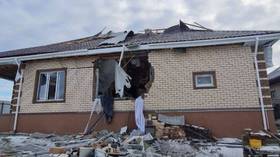War moves from battleground to broadcasting studio
The South Ossetian conflict managed to dominate the airwaves at a time when viewers should have been hooked on the Olympic Games rather than horrified by images of war. Georgia's PR campaign throughout the conflict has been directed towards the West, port
Moscow believes that has led to misleading information frequently appearing in influential international broadcasts.
The Georgian town of Gori became a broadcast battleground, as various media sources reported a Russian attack on the city.
Footage of what the Financial Times called the “ruins” of the city appeared on news networks – which came as a great surprise to Russian cameraman, Aleksandr Zhukov, who recognised his own footage as that of Tskhinvali and not Gori.
“When we arrived the news came that Gori was being shelled. I saw my footage and I said, 'That's not Gori, that's Tskhinvali! Having crawled the length and breadth of Tskhinvali I don't need much to tell,'” he said.
Larry King of CNN invited Soviet president Mikhail Gorbachev on air to speak his mind.
“I don't know why it is being presented that Russia invaded Georgia. This is all disinformation and lies … It's an information war,” said Gorbachev.
He was followed by Georgian president Mikhail Saakashvili, who waved papers at the camera and accused Gorbachev of being a man “who helped to bring down the KGB kingdom”, but who was now “justifying what the KGB people are doing in my country.” He went on to belittle the former Soviet leader's award of a Nobel Peace Prize in 1990.
While it may seem Russia has been 'losing the information war,' some major newspapers are beginning to tone down their initial anti-Russian stance.
The Washington Post has called the behaviour of the Georgian president throughout the crisis “erratic and provocative.”
“When it comes to apportioning blame for the latest flareup in the Caucasus, there's plenty to go around. The Russians were clearly itching for a fight, but the behaviour of Georgian president Mikhail Saakashvili has been erratic and provocative.
The United States may have stoked the conflict by encouraging Saakashvili to believe that he enjoyed American protection, when the West's ability to impose its will in this part of the world is actually quite limited … It is difficult to explain why Kosovo should have the right to unilaterally declare its independence from Serbia, while the same right should be denied to places such as South Ossetia and Abkhazia.”
Source: The Washington Post, 15 August 2008
Meanwhile, The Boston Globe writes that Saakashvilli made a strategic mistake.
“Given how overt the Kremlin's aims are, the fiery nationalist president of Georgia, Mikheil Saakashvili, blundered grievously when he responded to small-scale violence from local separatists in South Ossetia by sending Georgian troops to shell and assault the breakaway region's capital city.”
Source: The Boston Globe, 15 August 2008
And in London, The Independent's political commentator Mary Dejevsky chose to remind her readers just how the war began.
“And anyway, how did hostilities begin? Georgia sent troops into South Ossetia. The status of that region – which declared unilateral independence – is anomalous. It is inside Georgia's borders, but outside its control. But one reason why the dispute has not been solved is that the ”fudge“ over independence brought with it a degree of stability. Georgia's action upset that stability.”
Source: The Independent, 15 August 2008
French daily Le Figaro says the conflict is all about the continuing struggle between the two superpowers – Russia and the US.
“Even the most ardent adversaries of Moscow have no choice but to accept it was Georgian military forces that attacked the separatist pro-Russian province of South Ossetia, bombarding its capital and killing Russian peacekeepers who had been there for 15 years following the UN decision to maintain peace … From the moment Bush became president he has wanted Russia to be isolated both economically and geographically… He must think there is no difference between yesterday's Soviet Union and today's Russia.
For a moment Putin believed in Bush's friendship and tried to provide some gauge of good will. Wasn't it him who removed Russian military bases from Cuba and Vietnam? Has he not joined the OSCE? And that's despite the disillusion and anger when the US installed military bases in Central Asia, Georgia, the Czech Republic and Poland.”
Source: Le Figaro, 15 August 2008
Matthew Maly, an American sociologist and author of 'Russia as it is' says he's surprised by the media bias over events in South Ossetia. In his opinion, a deliberate misinformation campaign was carried out by the United States, a staunch ally of President Saakashvili.
He warns a similar campaign could take place ahead of the U.S. presidential elections in November this year.
“It took us 6 days to finally admit that it was indeed Georgia who attacked Russia. I think this is a big international misinformation operation that could be conducted only from the top. And I think that this is a dress rehearsal for influencing western opinion. Therefore I think that it is possible that in late October it will scare Americans into voting for McCain and abandoning Obama.”












